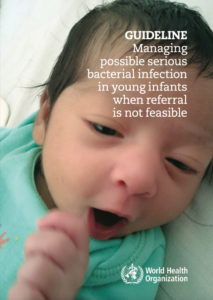This blog was originally published on AlignMNH.
Every year, 2.6 million newborns die globally. The majority of these deaths are preventable, and 99% of them occur in low-resource settings. Newborn sepsis, a life-threatening blood infection, is a leading killer of newborns. It is challenging to diagnose, requires skilled hospital care to treat, and according to a new study, is probably more common than we previously thought. Many of these deaths are preventable if we can improve our abilities to detect and manage possible serious bacterial infection (PSBI) in low-resource settings—a significant global health challenge.

Photography by Kate Holt courtesy of the Maternal and Child Survival Program
Detecting PSBI is difficult, but we have options
Due to their immature immune systems, newborns harboring a serious infection like sepsis may only have subtle signs of illness. A low temperature or decreased feeding may be the only sign that something is amiss, making detection challenging even for trained clinicians.
In response to this challenge, The World Health Organization’s Integrated Management of Childhood Illness (IMCI) strategy provides an evidence-based list of signs and symptoms that community health workers can look for in newborns, and then promptly refer them to the hospital. While IMCI does not provide the precision of a highly-trained health worker and laboratory diagnostics, it provides a robust option for detecting PSBI in newborns.
Managing PSBI is difficult, but we have options
Once detected, the standard of care for PSBI is hospital admission and 7-10 days of intravenous antibiotics. This level of care, however, is not attainable for the vast majority of newborns in the world. Long distances to the hospital, inadequate funds, transportation, and childcare, poor quality health facilities, inadequate antibiotic stock and poor trust of the health system are only some of the barriers to families seeking and receiving the standard of care for their sick newborn.
In response to this challenge, scientists studied simplified antibiotic regimens for treatment of PSBI when hospitalization is not possible, and found that various combinations of oral and intramuscular antibiotics could be administered as an outpatient safely and effectively. Based on this evidence, the World Health Organization issued recommendations on managing possible serious bacterial infection in young infants when referral is not feasible.

Scaling innovation in PSBI management is our present challenge, and we need more options
The solutions for detecting and managing PSBI in resource-limited settings are not perfect, but they have been shown to save lives, even when implemented and studied in routine settings. The World Health Organization’s operational guide provides useful guidance for scale considerations, including national benchmarks and collecting monitoring data. Bringing PSBI management solutions to scale, however, will require further innovation in service delivery, behavior change, monitoring of antibiotic resistance, and more.
These “scaling solutions” may hold insights for other health interventions stalled in scale-up. Global alliances, like the International Development Innovation Alliance (IDIA) and the Global Action Plan for Healthy Lives and Well-being for All (SDG 3 GAP), led by WHO, are working to create ecosystems for innovation and connect innovative solutions to country demand. Indeed, our only chance to reach SDG3 targets, including the reduction of preventable newborn deaths, may be to accelerate progress via innovation. How to scale the management of PSBI is our next creative challenge, and we cannot afford to wait.
References
- Shabina Ariff, Sajid Bashir Soofi, Zamir Suhag, Suhail Chanar, Maria Bhura, Zaib Dahar, Imran Ahmed, Ali Turab, Atif Habib, Yasir Bin Nisar, Samira Aboubaker, Steve Wall, Abdul Wahab Soomro, Shamim Ahmad Qazi, Rajiv Bahl, Zulfiqar A Bhutta, Implementation research to increase treatment coverage of possible serious bacterial infections in young infants when a referral is not feasible: lessons learnt, Journal of Public Health, 2022
- Awasthi S, Kesarwani N, Verma RK, Agarwal GG, Tewari LS, Mishra RK, et al. (2020) Identification andmanagement of young infants with possible serious bacterial infection where referral was not feasible in rural Lucknow districtof Uttar Pradesh, India: An implementation research. PLoS ONE 15(6): e0234212
- Rahman AE, Herrera S, Rubayet S, Banik G, Hasan R, Ahsan Z, et al. (2020) Managing possible serious bacterial infection of young infants where referral is not possible: Lessons from the early implementation experience in Kushtia District learning laboratory, Bangladesh. PLoS ONE 15(5): e0232675.
- Leul A, HailuT, AbrahamL, BayrayA,TerefeW, GodefayH, et al. (2021)Innovative approach for potential scale-up to jump-start simplified management of sick young infants with possible serious bacterial infection when a referral is not feasible: Findings from implementation research. PLoSONE 16(2):e0244192
- Wammanda RD, Adamu SA, Joshua HD, Nisar YB, Qazi SA, Aboubaker S, et al. (2020) Implementation of the WHO guideline on treatment of young infants with signs of possible serious bacterial infection when hospital referral is not feasible in rural Zaria, Nigeria: Challenges and solutions.PLoSONE 15(3):e0228718.
- Operationalizing management of sick young infants with possible serious bacterial infection (PSBI) when referral is not feasible in the context of existing maternal, newborn, and child health programmes. Geneva: World Health Organization and the United Nations Children’s Fund (UNICEF), 2017. Licence: CC BY-NC-SA 3.0 IGO.
- Guideline: Managing possible serious bacterial infection in young infants when referral is not feasible. Geneva: World Health Organization, 2015.
- Jehan F, Qazi S. Treating Sick Young Infants With Only Fast Breathing With Oral Amoxicillin in Resource-Limited Settings: Taking the High Road?. Clin Infect Dis. 2017;64(2):190-191. doi:10.1093/cid/ciw695
- Baqui AH, Saha SK, Ahmed AS, Shahidullah M, Quasem I, Roth DE, Samsuzzaman AK, Ahmed W, Tabib SM, Mitra DK, Begum N, Islam M, Mahmud A, Rahman MH, Moin MI, Mullany LC, Cousens S, El Arifeen S, Wall S, Brandes N, Santosham M, Black RE; Projahnmo Study Group in Bangladesh. Safety and efficacy of alternative antibiotic regimens compared with 7 day injectable procaine benzylpenicillin and gentamicin for outpatient treatment of neonates and young infants with clinical signs of severe infection when referral is not possible: a randomised, open-label, equivalence trial. Lancet Glob Health. 2015 May;3(5):e279-87. doi: 10.1016/S2214-109X(14)70347-X. Epub 2015 Apr 1. PMID: 25841891.
- African Neonatal Sepsis Trial (AFRINEST) group, Tshefu A, Lokangaka A, Ngaima S, Engmann C, Esamai F, Gisore P, Ayede AI, Falade AG, Adejuyigbe EA, Anyabolu CH, Wammanda RD, Ejembi CL, Ogala WN, Gram L, Cousens S. Simplified antibiotic regimens compared with injectable procaine benzylpenicillin plus gentamicin for treatment of neonates and young infants with clinical signs of possible serious bacterial infection when referral is not possible: a randomised, open-label, equivalence trial. Lancet. 2015 May 2;385(9979):1767-1776. doi: 10.1016/S0140-6736(14)62284-4. Epub 2015 Apr 1. PMID: 25842221.
- African Neonatal Sepsis Trial (AFRINEST) group. Oral amoxicillin compared with injectable procaine benzylpenicillin plus gentamicin for treatment of neonates and young infants with fast breathing when referral is not possible: a randomised, open-label, equivalence trial. Lancet. 2015;385:1758-1766. doi: 10.1016/S0140-6736(14)62285-6.
- Mir F et al. Simplified antibiotic regimens for treatment of clinical severe infection in the outpatient setting when referral is not possible for young infants in Pakistan (Simplified Antibiotic Therapy Trial [SATT]): a randomised, open-label, equivalence trial. Lancet Glob Health. 2017;5:e177-e185. doi: 10.1016/S2214-109X(16)30335-7